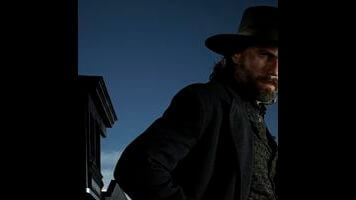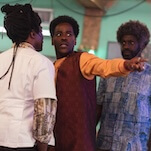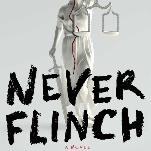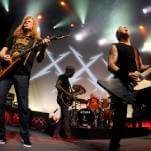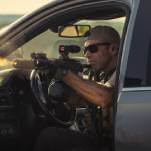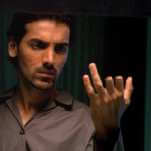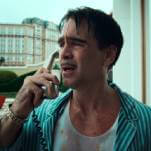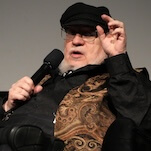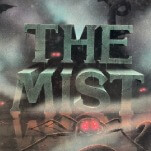Cable series with seasons that run for 10 episodes don't usually take a break when they're more than two-thirds of the way to the finish line. However, in a move that seems as well-thought-out as everything else about this show, Hell On Wheels, which airs on Sundays, premiered at such a time that it's about to have to miss a week or else air new episodes on Christmas. Because they assume that normal, good Americans are bonding with their families on December 25 and that the rest of us are at the movies, networks are loathe to burn off fresh programming on those days, except for Leverage, which airs a new episode on Christmas Day because it's Santa Claus' favorite show, and he's already gotten enough damn ties.
So after tonight, Hell On Wheels will be gone from the airwaves for the rest of December,* then come back, guns a-blazin', for its three concluding episodes, which I am hoping to Christ nobody in AMC's promotional department tries to get away with referring to as a "trilogy." For a show that gave a rat's ass about narrative momentum, this would qualify as unfortunate. As it is, it makes "Revelations" a sort of holiday, year's-end episode by default. In light of this, I have elected to rope this review in as an honorary part of The A.V. Club's year-end cultural coverage, which is heavily slanted towards compilations of the best, the worst, and the most jaw-dropping. Like, for instance:
Most Heavy-Handed Use Of A Flashback To Make An Ironic Point: "Revelations" opens with an Antebellum-era scene in which young Common… I mean, Common's character when he was a small boy, and played by a small boy, and not, sadly, Common himself wearing knee britches and a Buster Brown hat… is made to read aloud from the Bible for the amusement of his owner and his guests. Someone warns the plantation owner that it's a dangerous path he's going down if he's going to educate his darkies, but the smug old bastard assures his friend that the black boy has no more understanding of what he's saying than a parrot. Thanks in part to the self-amused acting and the Wal-Mart-photo-department-backdrop quality of the plantation house itself, the scene manages to be less subtle and sophisticated in its take on the relationship between slave and slaveholder than the one in Mandingo where Massa James Mason, as a recommended cure for rheumatism, sits in his favorite chair pressing his bare feet into the tummy of a black child lying on the floor, who is surreptitiously stealing sips from the glass of wine he keeps laying near his head.
The David-and-Maddie-Gettin'-It-On "Be Careful What You Wish For" Certificate goes to the big action scenes in this episode. I was rooting for some real action scenes to break lose on this show, and "Revelations" makes a couple of large-scale attempts to deliver the goods, but it's a case of too-clumsy-too-late. The first one does at least move the story along, in the sense that it gets Cullen Bohannon and Common out of the camp. It seems that Irish Steve the Drunk has finally had all he can take of Common and his uppity, smart-mouthing, miscegenating, interracial-boxing-match-winning ways, and he and his gang of white lowlifes are going to hang him, with the blessing of the Swede, who figures it's a small price to pay for letting the boys "let off some steam." Bohannon rides his goddamn horse right into the room where Common is dangling from the rafters, rescues him, shoots everyone who objects too strenuously, and rides off into the great unknown with Common, in the best "Come Back To The Raft Ag'in, Huck Honey!" tradition.
There's also a shootout in the woods after Irish Steve the Drunk, who I'm very happy to say will be expostulating no more on this particular stage, and his fellow would-be badasses, make the lethal mistake of catching up with Bohannon and Common.
Worst Ambitious Paraphrase Of A Line From The Untouchables: When the black laborers try to come to Common's aid, using only their tools as weapons, Irish Steve the Drunk laughs: "Looks like you've brought shovels to a gunfight. No matter, we'll use 'em to dig your graves."
Dialogue Scene Intended To Illustrate A Sociological/Political Point That Even John Sayles Would Say Is A Little Too On-The-Nose: Putting the noose around Common's neck, Steve tells him, "I don't know if you're aware of it, but we Irish are the niggers of the British empire." Apparently, somebody thought this might not be crystal-clear enough for the real deadheads in the audience, because then Common actually translates for them: "That's what this about? You're showing the world you ain't at the bottom of the barrel no more?" You're damn right it is, says Steve. Common is too proud to point out to him that if the Irish kill off all the blacks, then they'll be right back at the bottom of the barrel again.
Worst Salesmanship Of A Piece Of Western Bad-Ass Dialogue: About to kill a man who's determined to go down talking trash, Common rasps, just before pulling the trigger, "My name is Elam Ferguson. Be sure and tell the devil that when he asks who killed you." Yeah, whatever, but I'm still calling him "Common."
Best Salesmanship Of A Piece Of Western Bad-Ass Dialogue That Still Doesn't Really Sound Right In This Context: Taking in the scene after Bohannon has busted up the hanging, the ever-meditatative Swede says, "I seen men die screamin'. I seen men die with nary a bleatin'." When the bit player next to him points at the dead body on the floor and says, "Well, this one died tryin' to draw down on Cullen Bohannon," the Swede nods and says, "Well, then, perhaps he was stupid after all."
Weirdest Temporary Transformation Of A Character Into A Heather: Apparently to stir up mischief, the Swede tells Durant, who is accompanying Lily Bell on a reconnaissance mission back to civilization, "I hef seen how she luck at you." His little joke pays off, part-way, when Durant, at the end of the episode, delivers a torturous speech in which he informs Lily that, if she'd like for him to leave his wife and make her his partner in both life and the building of the railroad, she should consider the ball to be in her court. I just have no idea why the Swede is playing this game. Unless he's not playing a game and there really is supposed to be something encouraging in the way Lily Bell has been lucking at Durant, in which case somebody should have told the actress. The scene reminded of the end of Elisabeth Röhm's last episode of Law & Order, where Fred Dalton Thompson told her she was fired, and the first thing out of her mouth was, "Is this because I'm a lesbian?" and you could tell from Thompson's reaction that he had only given the script they were performing a cursory read of his own lines before shooting, and this was the first he'd heard about it.
Most Inevitable Transformation Of A Character Into Ming The Merciless: The Swede, again, dispatching his winged monkeys to dispose of Bohannon with the line, "The rebel has ooped the balance again, and he moost be dealt with!"
The Paddy Chayefsky Memorial Plaque For Big, Meant-To-Be-Show-Stopping Speech About A Character's Back Story Whose Point Seems To Be That God Is A Hack Writer: Hunkered around the campfire and having already told the ones about the guy with the hook who's been haunting lovers' lane and the woman whose overuse of hair spray trapped the spiders in her beehive until they ate their way down into her brain (MWAH-HA-HA!), Bohannon finally fills Common in his past. It seems that he came home to find that his wife, Mary, had been hanged and that his son had been burned alive in the hay loft. That's not all, though: The black retainer who'd raised him had held the boy in his last moments, as if trying to shield his body from the flames. Bohannon admits now that he hadn't understood when his wife persuaded him to free his slaves before the war (it "pissed me off," he says, but "Mary had a way of talking me into things"), but that he experienced an epiphany as he stared at what was left of his white son and his black protector. "You couldn't really tell where one ended and one began," all black and ashy and fused together the way they were, almost as if skin color don't rightly matter. The punch line: "I just remember standin' there, and I'm thinkin' to myself, God's got a funny way of teaching you things." (There's a true grace note at the very end of the scene, when Bohannon looks at the impassive, poker-faced Common and says, "I wouldn't give a shit if I was you, either.")
Least Satisfying "You Tell 'Em" Moment: When Lily Bell visits the home of her mother-in-law and is inexplicably surprised and embarrassed to learn that they're all still in mourning for her dead husband, while she's dressed as if to go plug the transcontinental railroad on the Letterman show. Overhearing one of her sisters-in-law talking about her behind her back, though "overhearing" doesn't seem quite the right term, since the way the scene is blocked, it looks as if Lily is practically standing in the woman's lap, Lily slaps her and delivers a garbled speech in which she tries to talk up her husband's courage and give him credit for having distracted their attacker long enough to help her stay alive until she,and not he, as the lying newspapers would have it, could save her own life. The sequence at the house of mourning also boasts the strangest homage to Jerome Robbins ever seen outside a Gap commercial: Getting up from their thrones and going to greet Lily, the mother and her daughters sway towards the camera as if about to sing, "When you're a Jet, you're a Jet all the way…"
Most Satisfying "You Tell 'Im" Moment: Durant screwing over the slimy pol who'd tried to blackmail him by giving him the wrong insider trading information. The funny thing is that you can see what Durant is up to from a mile away, but you want to see him ruin the guy so badly that you're ready to go along with it, partly because the guy is so stupid for not seeing what Durant is up to.
Most Welcome Seasonal Tribute: In 1912, the writer and dandy Max Beerbohm published A Christmas Garland, consisting of 12 Christmas-themed parodies of major English-language authors of his day, some of whom (Henry James, Thomas Hardy, Joseph Conrad, Rudyard Kipling) have managed to remain better-known than others (Maurice Hewlett, G. S. Street), though the book as a whole is so beautifully executed that it remains a terrific holiday gift for the English major on your list, whether he's familiar with all of Beerbohm's targets or not. I don't know for sure if the people behind Hell On Wheels had Beerbohm in mind when they turned in this perfect self-parody of an episode, or even if the self-parody was intentional, but it's still the kindest way I have of accounting for it.
[*Correction: This review originally stated that the next episode of "Hell On Wheels" wouldn't air until January 8, but in fact the series returns on January 1. The investigative-reporter-turned-managing-editor on "Boss" would be mighty sore at me for passing along bad intel culled from Wikipedia.—P.N.]
